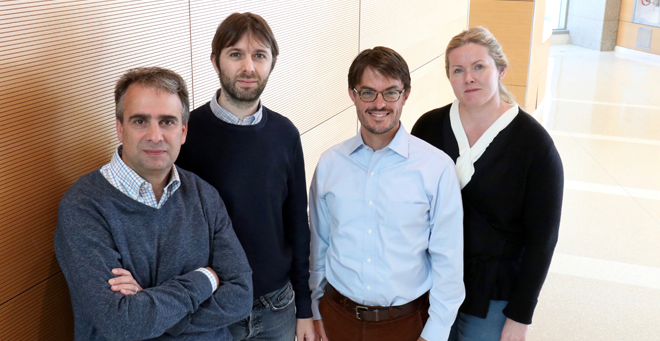 |
|
|
Rainin Foundation Award winners (from left) Neal Silverman, PhD; Andrea Reboldi, PhD; Read Pukkila-Worley, MD; and Katherine Fitzgerald, PhD |
Three UMass Medical School faculty members have received 2017 Innovator Awards from the Kenneth Rainin Foundation. The Rainin Foundation supports high-risk research and challenges investigators to push boundaries to advance the goal of predicting and preventing inflammatory bowel disease (IBD). Its Innovator Awards program provides $100,000 grants to IBD researchers for one-year research projects; recipients who demonstrate significant progress may receive up to two additional years of support.
The 2017 Rainin Innovator awardees and projects are:
- Read Pukkila-Worley, MD, Innate Immune Homeostasis in Intestinal Epithelial Cells
- Andrea Reboldi, PhD, Dietary Cholesterol as a Central Hub for Intestinal Immunity and Microbial Homeostasis
- Neal Silverman, PhD, Investigating the Role of SLC46A3 in NOD1/2-Mediated GI Inflammatory Responses
Each faculty member was encouraged to pursue the awards by Kate Fitzgerald, PhD, the Worcester Foundation Chair in Biomedical Sciences, professor of medicine and director of the UMMS Program in Innate Immunity. Dr. Fitzgerald received 2015 and 2016 Rainin Breakthrough Awards (renamed Innovator Awards in 2017) and two subsequent years of funding from the foundation following her lab’s discovery of a long noncoding RNA that acts as a break on the immune response of intestinal inflammation in inflammatory bowel disease.
“Rainin grantees have the opportunity to attend an annual symposium that always has a fantastic line-up of speakers working in the area of IBD,” said Fitzgerald. “Being part of these meetings has helped facilitate new interactions, allowing us to identify new collaborators and move our work in new directions.”
The Pukkila-Worley lab studies the role of intestinal epithelial, the cells that line the intestine, in mounting inappropriate immune responses in patients with IBD.
“Our goal is to facilitate the development of new therapies for IBD that specifically limit the hyperactivation of intestinal immune responses to blunt intestinal inflammation in patients with IBD,” said Dr. Pukkila-Worley, assistant professor of medicine in the Division of Infectious Diseases and Immunology. “With this funding we will explore how a novel regulator of inflammatory responses we have identified in the cells that line the intestine acts to suppress deleterious immune responses.”
Dr. Reboldi, assistant professor of pathology, will use the funding to explorethe role of dietary cholesterol in shaping the commensal bacteria and in controlling the pathogenesis and development of IBD.
“This grant will allow us to investigate how dietary cholesterol absorbed by the gut locally regulates intestinal antibody secretion and shapes intestinal commensals,” said Reboldi. “Defining the metabolic mechanisms that maintain intestinal homeostasis could lead to pharmacological interventions to control intestinal inflammation.”
The Silverman lab studies the mechanisms of innate immune signaling. It previously discovered a family of transport proteins in fruit flies that may be involved in developing inflammatory bowel disease. The Rainin Foundation funding will support a new direction for this research.
“With this support, our lab will explore these proteins in mouse models of IBD,” said Dr. Silverman, professor of medicine in the Division of Infectious Diseases and Immunology. “I am thrilled to be translating basic discoveries, made in our favorite invertebrate model system, to application in mammalian models of human disease.”
Each new Rainin Innovator awardee may receive up to two additional years of support from the program, as has Fitzgerald. “This is a terrific foundation to be involved with,” she said.
Related stories on UMassMedNow:
Read Pukkila-Worley investigates mechanisms that prevent infections before they take hold
Fitzgerald, Brass named Thomson Reuters Report most influential scientific minds
Katherine Fitzgerald focuses on novel discoveries in innate immunity
Neal Silverman awarded grant from the Mizutani Foundation for Glycoscience